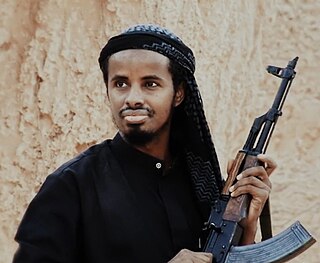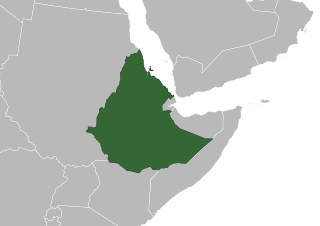
Eritrea is an ancient name, associated in the past with its Greek form Erythraia, Ἐρυθραία, and its derived Latin form Erythræa. This name relates to that of the Red Ocean, then called the Erythræan Sea, from the Greek for "red", ἐρυθρός, erythros. But earlier Eritrea was called Mdre Bahri. The Italians created the colony of Eritrea in the 19th century around Asmara and named it with its current name. After World War II, Eritrea annexed to Ethiopia. Following the communist Ethiopian government's defeat in 1991 by the coalition created by various armed groups notably the EPLF and the TPLF among others, Eritrea declared its independence. Eritrea officially celebrated its 1st anniversary of independence on May 24,1994.

The Horn of Africa (HoA), also known as the Somali Peninsula, is a large peninsula and geopolitical region in East Africa. Located on the easternmost part of the African mainland, it is the fourth largest peninsula in the world. It is composed of Ethiopia, Eritrea, Somalia and Djibouti; broader definitions also include parts or all of Kenya, Sudan, South Sudan, and Uganda. The term Greater Horn Region (GHR) can additionally include Burundi, Rwanda, and Tanzania. It lies along the southern boundary of the Red Sea and extends hundreds of kilometres into the Guardafui Channel, Gulf of Aden, and Indian Ocean and shares a maritime border with the Arabian Peninsula of Western Asia.
The Dir is one of the largest and most prominent Somali clans in the Horn of Africa. They are also considered to be the oldest Somali stock to have inhabited the region. Its members inhabit Djibouti, Somalia, Ethiopia, and northeastern Kenya.
Filipos Woldeyohannes is an Eritrean general who has served as Chief of Staff of the Eritrean Defence Forces since March 2014. He was appointed after his predecessor died in early March 2014.
Hamid Idris Awate was a prominent Eritrean guerrilla commander and a symbol of the Eritrean War of Independence and independence struggle.
The provinces of Eritrea existed since pre-Axumite times and became administrative provinces from Eritrea's incorporation as a colony of Italy until the conversion of the provinces into administrative regions. Many of the provinces had their own local laws since the 13th century.
The Alliance for the Re-liberation of Somalia (ARS) was political party formed in Eritrea during September 2007 as the successor to the Islamic Courts Union (ICU). It served as the principal political opposition to the Transitional Federal Government of Somalia (TFG). The organization would also participate in the 2007 and 2008 years of the insurgency during the Ethiopian intervention in Somalia.

The Khatmiyya is a Sufi order or tariqa founded by Sayyid Mohammed Uthman al-Mirghani al-Khatim. The Khatmiyya is the largest Sufi order in Sudan, Eritrea and Ethiopia. It also has followers in Egypt, Chad, Saudi Arabia, Somalia, Uganda, Yemen and India.

Eritrea ( ERR-ih-TREE-ə or -TRAY-; Tigrinya: ኤርትራ, romanized: Ertra, pronounced[ʔer trä], officially the State of Eritrea is a country in the Horn of Africa region of Eastern Africa, with its capital and largest city at Asmara. It is bordered by Ethiopia in the south, Sudan in the west, and Djibouti in the southeast. The northeastern and eastern parts of Eritrea have an extensive coastline along the Red Sea. The nation has a total area of approximately 117,600 km2, and includes the Dahlak Archipelago and several of the Hanish Islands.

Ahmed Abdi Godane, also known as Mukhtar Abu Zubair, was the Emir (leader) of Al-Shabaab, an Islamist group based in Somalia. Godane, who received training and fought in Afghanistan, was designated by the United States as a terrorist. The exact date of Godane's rise to al-Shabaab's Emir is debated, although it seems he ascended to this position in December 2007.

Italian Eritrea was a colony of the Kingdom of Italy in the territory of present-day Eritrea. The first Italian establishment in the area was the purchase of Assab by the Rubattino Shipping Company in 1869, which came under government control in 1882. Occupation of Massawa in 1885 and the subsequent expansion of territory would gradually engulf the region and in 1889 borders with the Ethiopian Empire were defined in the Treaty of Wuchale. In 1890 the Colony of Eritrea was officially founded.
Muḥammad ibn ʾIbrāhīm ibn ʿAbd al-Laṭīf ibn ʿAbd al-Raḥmān ibn Ḥasan ibn Muḥammad ibn Abd al-Wahhāb Al Shaykh Al-Tamīmī, was a Saudi Arabian religious scholar who served as the first Grand Mufti of Saudi Arabia from 1953 until his death in 1969. He is recognized as being amongst the forefront of Salafi theologians in history.

The Second Italo-Senussi War, also referred to as the Pacification of Libya, was a conflict that occurred during the Italian colonization of Libya between Italian military forces and indigenous rebels associated with the Senussi Order. The war lasted from 1923 until 1932, when the principal Senussi leader, Omar al-Mukhtar, was captured and executed. The Libyan genocide took place during and after the conflict.

Hassan Mamoun was the Grand Imam of al-Azhar or Shaykh al-Azhar between 1964 and 1969 and before that the Grand Mufti of Egypt between 1955 and 1960.

Somali nationality law is regulated by the Constitution of Somalia, as amended; the Somali Citizenship Law, and its revisions; and various international agreements to which the country is a signatory. These laws determine who is, or is eligible to be, a national of Somalia. The legal means to acquire nationality, formal legal membership in a nation, differ from the domestic relationship of rights and obligations between a national and the nation, known as citizenship. Nationality describes the relationship of an individual to the nation under international law, whereas citizenship is the domestic relationship of an individual and the state. Somali nationality is typically obtained under the principle of jus soli, i.e. by birth in Somalia, or jus sanguinis, born to parents with Somali nationality. It can be granted to persons with an affiliation to the country, or to a permanent resident who has lived in the country for a given period of time through grant (naturalization).

Usman bin Yahya, Utsman ibn Yahya or Othman bin Yahya was an Islamic scholar who served as Grand Mufti of Batavia in 19th century of Dutch East Indies.
The Grand Mufti of Australia is a Sunni Muslim cleric, or Grand Mufti, chosen to represent and answer questions from the growing Muslim population. Nominated by the Australian National Imams Council (ANIC), the current Grand Mufti of Australia since 2018 is Ibrahim Abu Mohammed. Mohammed previously held the position from 2011–2018, and became Grand Mufti again after his successor, Abdel Aziem Al-Afifi died in office after a four-month tenure.
Ahmed Mohamed Jasir, is one of the most significant leaders in Eritrean history of struggle for independence from 1958 to 1990.

Beginning with the Kingdom of Aksum, Ethiopia's territory evolved significantly through conquest of the lands surrounding it. Strong Aksumite trading partnerships with other world powers gave prominence to its territorial expansion. In 330, Aksum besieged the Nubian city of Meroë, marking the beginning of its great expansion. It finally declined after the rise of Islamic dominion in South Arabia, and it ultimately collapsed in the 10th century.










